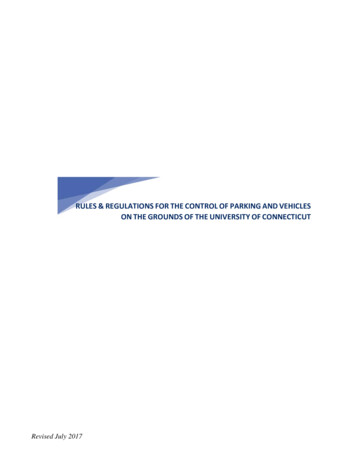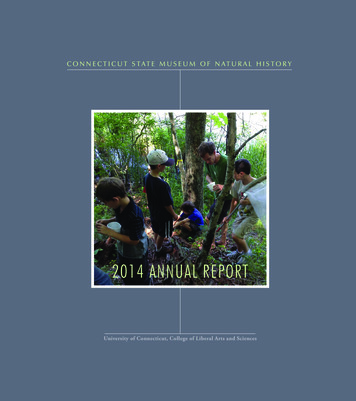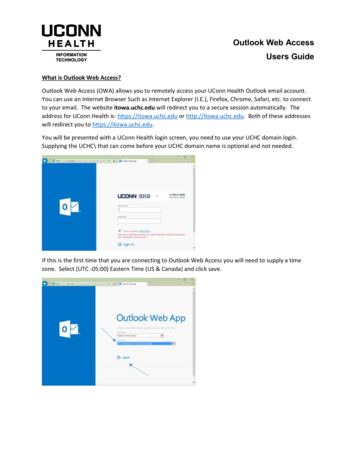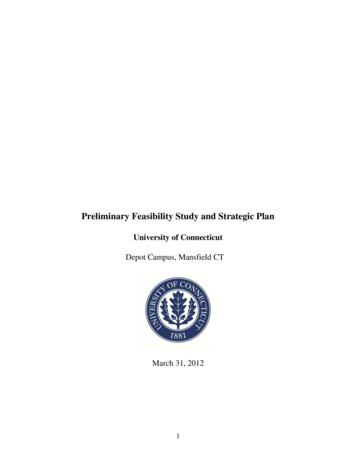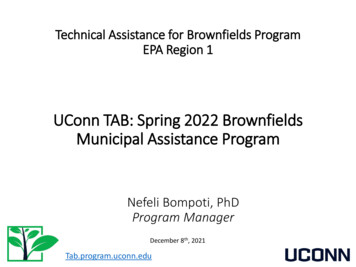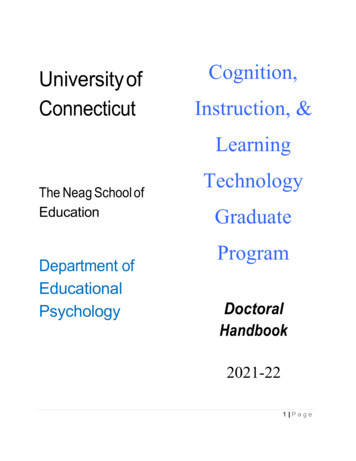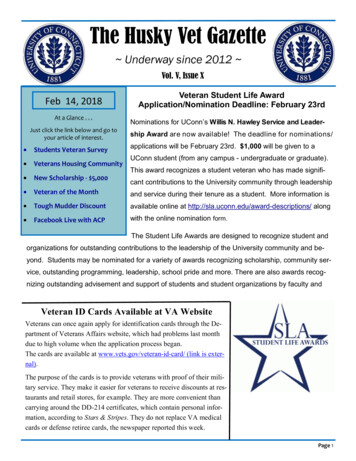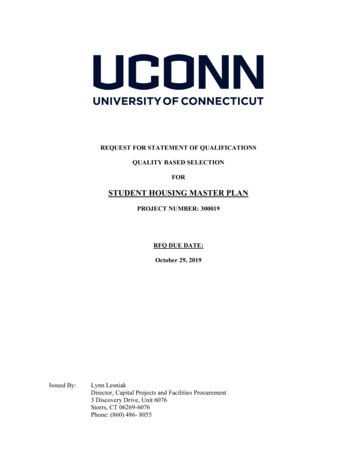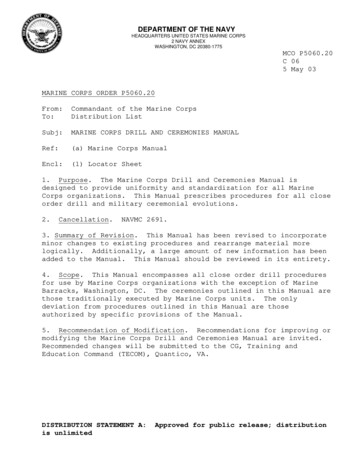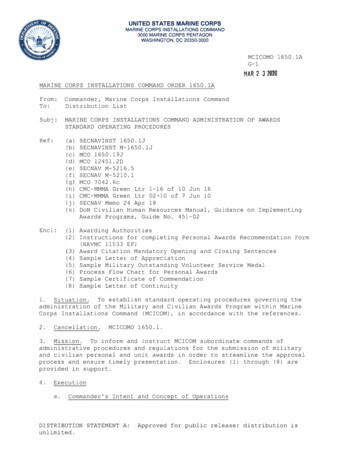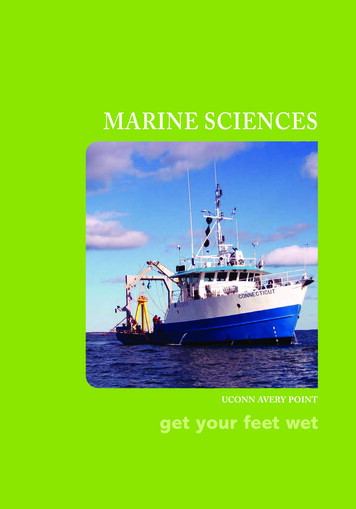
Transcription
MARINE SCIENCESUCONN AVERY POINTget your feet wet
WHAT ISMARINE SCIENCES?A Bachelor’s degree program in Marine Sciences providesopportunities to learn about science of the marine environ ment and its relationship to society. This program is designedto inspire you intellectually andchallenge you academically. Thecurriculum integrates courses inmarine biology, chemistry, geologyand physics with studies in policy,law, economics, and resourcemanagement of marine environ ments. The program is quantitative,practical, and experiential innature. Starting your first semester,most of the courses in your major in clude work in many of the region’s various marine habitats.Learning through hands on experiences, you’ll get your feetwet and your hands dirty. The program is analogous to arigorous environmental sciences degree, but focused on theenvironment that covers more than two thirds of theplanet the oceans.You will take many or all of your classes at the University ofConnecticut’s Avery Point campus, an environmentimmersed in research, outreach, and marine education. Thecampus is located on the shore of Long Island Sound.Students beginning the program at the Storrs campus willtypically join the Avery Point community for the last two yearsof their coursework, or earlier to take advantage ofindependent research opportunities. The Avery Pointcampus is home to many organizations and facilities whichcan provide you with opportunities to learn beyond theclassroom. You will benefit from access to the University ofConnecticut’s fleet of research vessels, and state of the artlaboratories and classrooms in the marine sciences andtechnology facility.“Combine a love for the scienceswith a passion for the ocean”
CAREERS IN MARINE SCIENCESA degree in Marine Sciences prepares graduatesfor a wide range of fields, including researchtechnician, environmental consulting, fisheriesand resource management, science education,conservation, environmental regulation, policyand law, as well as graduate study in the marinesciences (oceanography and marine biology).The highly unique currriculum results in graduateswho are excellent scientists that also possess theability to effectively communicate scientific issuesto non scientists such as economists, regulators,and politicians.For a student who wishes to combine a love forthe sciences with a passion for the ocean and thecoastal environment, the Marine Sciences degreefrom the University of Connecticut can provideeducation leading to a challenging and excitingcareer.Are you interested in marine sciences but not sureabout a career? Here is a sampling of the typesof careers a student with a background in themarine sciences may be qualified to pursue:Marine EcologistFisheries / Shellfish BiologistEnvironmental ConsultantOceanographerMarine EducationAquatic ChemistAquacultureEco tourismEnvironmental WriterFederal/State Environmental ProtectionNon profit ConservationScience TeacherThis web site, http://www.marinecareers.net,explores a wide range of marine science relatedcareers and introduces you to the men andwomen who work out in the field and in labs,helping to preserve and protect our oceans andcoastlines.Also, to find our what recent graduates of our pro gram are doing now, just visit our web site:http://marinesciences.uconn.edu/marine.
http://marinesciences.uconn.edu/marineCOURSES DESIGNED TOINSPIRE AND CHALLENGE YOUThe Marine Sciences curriculum blends a core of marine science courses withrelevant, ocean related social science courses in small classes taught by top notch faculty, emphasizing practical, hands on experience. The program isunique in the extent and frequency of field and lab work integrated throughoutthe curriculum. The structure of the major includes the following:Foundation Courses provide solidpreparation for your more advancedclasses in Marine Sciences.Theseclasses include Biology, Chemistry,Physics, and Mathematics as well as In troduction to Oceanography.Marine Sciences Core Courses arespecifically designed for the MarineSciences major. All offer an integrated,holistic presentation of interdisciplinaryperspectives related to the coastal andocean environments.Social Sciences Courses offered in Eco nomics, Policy, Law, and Managementhelp you to apply your expandingknowledge of marine sciences to issuesconcerning man’s use of the sea.Marine Science Electives are ad vanced courses in Marine Biology,Physics, and Chemistry. Your choicesbuild on the topics explored in the foun dation courses and help you developareas of expertise.Capstone Courses provide an opportu nity to integrate knowledge you gainedin earlier courses and apply it to practi cal situations. These courses are taughtin a case study type format similar tothat used by post graduate businessand law schools.Electives can be chosen from anydepartment to tailor your education toyour own interests and career goals.Optional Internships offer hands onexperience for juniors and seniors towork in a job setting that utilizes youreducation. For example, your job maybe at a local business, a non profit or ganization, or a federal or local gov ernment agency.Independent Research credits can beused towards Marine Science Electives.This option formally integrates one on one research experience with facultymentors into the curriculum.Minors in Marine Biology or Oceanography are available withat least 15 credits of 3000 or higher level work.
COURSESMARINE SCIENCES CORE COURSESIntroduction to Oceanography – An introductory class with laboratory thatemphasizes the interactions and interrelationships of physical, chemical,biological, and geological processes that contribute to both the stability andvariability of the marine environment.Coastal Systems Science I, II – A two semester introduction to the biological,chemical, physical, and geological structure and function of coastal systems.The course is organized around habitats, with an integrated treatment ofphysics, chemistry, and biology for each.Environmental Reaction and Transport – A systems perspective on chemical andbiological relationships that couple the air, land, and sea.The Hydrosphere and Climate Change – A timely course that reviews the roleand response of the oceans in a changing global climate.Measurement and Analysis in Coastal Ecosystems – An upper division courseemphasizing field and lab experience in which you design and execute projectsto study ecological processes in local coastal habitats, such as salt ponds,estuaries, and Long Island Sound. This course provides practical training oninstruments commonly used in the marine and environmental sciences in thepublic and private sectors.Coastal Circulation and Sediment Transport – An exploration of circulation andmixing in estuaries and the inner continental shelf, and the related geologicalprocesses.SOCIAL SCIENCES COURSESScience and the Coastal Environment – An in depth analysis of real world casestudies. Students work in teams to explore the link between science and soci ety in our coastal environment.Economics of the Oceans – This course discusses the economics of industries thatuse and manage ocean resources. Focus includes the applications of industrialorganization, law and economics, natural resource theory, and environmentaleconomics.Human Modifications of Natural Environment – A geographical and historicalinterpretation of the changing relationships between culture and environment.Emphasis is placed upon the modification of the biophysical environment bypre agricultural, agricultural and urban societies in Europe, southwest Asia, andNorth America.Environmental Law – This class is designed as an overview of environmental lawincluding the common law practices of nuisance, negligence, and trespass.Emphasis will be on federal, state, and municipal programs addressing clear air,clean water, hazardous waste, inland wetlands, coastal zone management,and prime agricultural farm land and aquifer protection.Geographic Information Systems – A course that equips students with profi ciency in mapping and information management techniques routinely used byemployers in the science and policy arenas.Please note that this is only a small sampling of courses a student may choose to take.Other courses may include Resource Economics, Marine Fisheries, Integrated Coastal ZoneManagement, for example.
PARTICIPATE IN RESEARCHMarine Sciences undergraduates are encouraged to explore their chosen field ofstudy first hand. Undergraduate research engages students in the process ofinquiry, stimulates independent learning, promotes effective communication skills,and celebrates undergraduate scholarship. Students work closely with faculty inthe lab and field. As an old proverb states,“I hear, and I forget. I see, and I remember. I do, and I neAT THEAVERY POINT CAMPUSAmple opportunities for students to explore career options through personal andeducational growth are available. A variety of internships are posted ernships.html. For healthyrecreation tied to the curriculum and location, the active and vibrant studentcommunity includes both a sailing club and a scuba club.The campus is a nexus for marine expertise. Other entities on campus include:The Rankin Research Laboratory, a 2,400 square foot wet laboratory with a green house. Current research projects include the effect of harmful algae blooms onzooplankton and bivalve physiology and fish behavior.The Marine Sciences Technology Center, which supports research efforts byproviding small boats, operation of the R/V Connecticut and R/V Weicker, sci entific SCUBA diving, and marine and electronic shops.The Connecticut Sea Grant College Program, part of a national network whosemission is the conservation and wise use of marine resources through research, ed ucation, and outreach. The program focuses on healthy coastal ecosystems,aquaculture, sustainable safe seafood, and marine education.The Northeast Underwater Research, Technology and Education Center (NURTEC)supports research and education using advanced underwater technologies suchas occupied submersibles, robotic vehicles and mixed gas diving.
FREQUENTLY ASKEDQUESTIONSHow do I apply to the MarineSciences major?Is there an Honors Program atAvery Point?Can I arrange a campustour?What housing is available?To apply, visit the UConn website,http://www.admissions.uconn.edu,to access the online application orcontact the Office of Undergradu ate Admissions at 2131 HillsideRoad, U 3088, Storrs, CT 06269 orcall (860) 486 3137.To set up a Talk and Tour appoint ment for the Avery Point campus,simply send an email message to:beahuskyaverypoint@uconn.edu orcall the Admissions Office at (860)405 9026. A virtual tour is availableat www.averypoint.uconn.edu. Totour the Storrs campus, contact theLodewick Visitors Center at (860)486 4900 or email tours@uconn.edu.Can I take classes at Storrs?You can take most classes for yourfirst two years either at Storrs or AveryPoint. Some lectures may be avail able at both Storrs and Avery Pointthrough distance learning technol ogy with fully interactive voice andvideo. You will complete the finaltwo years of your degree program atAvery Point.Yes. There is an Honors ScholarProgram available for students whohave earned a specific grade pointaverage. Students in this programwill further their education with aresearch project and senior thesis intheir area of choice.The Storrs campus provides housingon campus. There is no housing atthe Avery Point campus. However,off campus housing within threemiles of campus is available at localluxuryapartmentcomplexes.Please call the Avery Point Off Cam pus Housing Coordinator at (860)405 9262.Is study abroad an option?Yes. UConn offers more than 300study abroad programs in morethan 65 countries on six continents.Marine science students may studyin places like Mexico, Costa Rica, orthe Turks and Caicos Islands, toname a few.If you do not see your question here,please feel free to call (860) 405 9026,email marine@uconn.edu or look for an swers to your questions at our web site:www.averypoint.uconn.edu.Information about the Avery Point undergraduate researchprogram (APURP) can be found on the Avery Point web pageunder “Academics & Research” at www.averypoint.uconn.edu.You will get to know faculty and learn about the process ofselecting a research topic, conducting your own research, andperhaps presenting your findings at an appropriate colloquium.
UNIVERSITY OF CONNECTICUTAVERY POINT CAMPUSFor more information, please contact:Admissions OfficeUConn Avery Point Campus1084 Shennecossett RoadGroton, CT 06340(860) 405 9026www.averypoint.uconn.eduUConn Marine SciencesTo apply to UConn’s Avery Point campus, please contact:University of ConnecticutOffice of Undergraduate Admissions2131 Hillside Road, Unit 3088Storrs, CT 06269 3088(860)486 3137www.admissions.uconn.eduUniversity of ConnecticutAvery Point Campus DirectionsTake I 95 north/south to Exit 87, Route 349/Clarence B. Sharp Highway.Continue on Route 349. At second traffic light, turn right. At next traffic light,which is Benham Road, turn left. Proceed for about 1.5 miles to the entranceof UConn’s Avery Point campus. The Admissions Office is located on thethird floor of the historic Branford House mansion.
beahuskyaverypoint@uconn.edu or call the Admissions Office at (860) 405 9026. A virtual tour is available at www.averypoint.uconn.edu. To tour the Storrs campus, contact the Lodewick Visitors Center at (860) 486 4900 or email tours@uconn.edu.

